Your search returned 13 results in the Theme: citizen kid series.
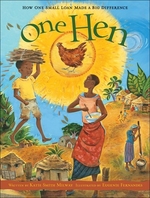
1 HEN - HOW A SMALL LOAN MADE A BIG DIFF
By: katie milway | Published: February 2008
Inspired by true events, One Hen tells the story of Kojo, a boy from Ghana who turns a small loan into a thriving farm and a livelihood for... [Read More]
Inspired by true events, One Hen tells the story of Kojo, a boy from Ghana who turns a small loan into a thriving farm and a livelihood for many. After his father died, Kojo had to quit school to help his mother collect firewood to sell at the market. When his mother receives a loan from some village families, she gives a little money to her son. With this tiny loan, Kojo buys a hen. A year later, Kojo has built up a flock of 25 hens. With his earnings Kojo is able to return to school. Soon Kojo's farm grows to become the largest in the region. Kojo's story is inspired by the life of Kwabena Darko, who as a boy started a tiny poultry farm just like Kojo's, which later grew to be the largest in Ghana, and one of the largest in west Africa. Kwabena also started a trust that gives out small loans to people who cannot get a loan from a bank. One Hen shows what happens when a little help makes a big difference. The final pages of One Hen explain the microloan system and include a list of relevant organizations for children to explore. One Hen is part of CitizenKid: A collection of books that inform children about the world and inspire them to be better global citizens.
Theme: Character Education, Citizen Kid Series
- ISBN
9781554530281 - Binding
Hardcover Canadian - Category
Social Studies - Issues (economic, Political And Social)
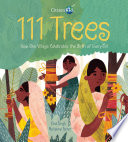
111 TREES - HOW ONE VILLAGE CELEBRATES THE BIRTH OF EVERY GIRL
By: rina singh | Published: October 2020
A boy grows up to make positive change in his community. After suffering much heartache, Sundar decides change must come to his small Indian village.... [Read More]
A boy grows up to make positive change in his community. After suffering much heartache, Sundar decides change must come to his small Indian village. He believes girls should be valued as much as boys and that land should not be needlessly destroyed. Sundar’s plan? To celebrate the birth of every girl with the planting of 111 trees. Though many villagers resist at first, Sundar slowly gains their support, and today, over a quarter of a million trees grow in his village. A once barren, deforested landscape has become a fertile, prosperous one where girls can thrive. Sure to plant seeds of hope in children. Improving the world is within everyone’s reach.
Theme: India, Environmental Issues, Citizen Kid Series
- ISBN
9781525301209 - Binding
Hardcover Canadian - Category
Biography
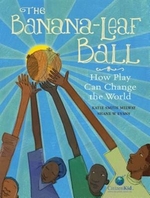
BANANA-LEAF BALL - HOW PLAY CAN CHANGE
By: katie milway | Published: April 2017
Separated from his family when they were forced to flee their home, a young East African boy named Deo lives alone in the Lukole refugee camp in... [Read More]
Separated from his family when they were forced to flee their home, a young East African boy named Deo lives alone in the Lukole refugee camp in Tanzania. With scarce resources at the camp, bullies have formed gangs to steal what they can, and a leader named Remy has begun targeting Deo. Then one day a coach gathers all the children to play soccer. Though Deo loves soccer and has even made his own ball out of banana leaves, he's unsure at first about joining in when he sees Remy on the field. But as Deo and the other boys get drawn into the game, everything begins to change. Their shared joy in playing provides the children --- including Remy --- with a sense of belonging. ?Ball by ball, practice by practice, children who were once afraid of each other laugh together,? the book explains, and ?no one feels so alone anymore.? Based on a true story, Katie Smith Milway's inspiring tale shows how a desperate situation can be improved by finding common ground through play. It provides a perfect starting point for discussing the social justice issues surrounding the growing number of refugees worldwide. Award-winning Shane W. Evans's artwork powerfully and poignantly personalizes for children the experience of refugees. Furthermore, the book examines the value of using sports to build pro-social behavior, particularly as it relates to bullying. By depicting characters who change and evolve over the course of the story, kids of all backgrounds and experiences will find something positive to relate to. The back matter contains information about the ?real? Deo, instructions for games that build trust and inclusion through play, and suggestions for how to support play-based nonprofit organizations.
Theme: Social Justice , Citizen Kid Series
- ISBN
9781771383318 - Binding
Hardcover Canadian - Category
Social Studies - Issues (economic, Political And Social)
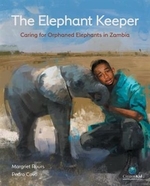
ELEPHANT KEEPER - CARING FOR ORPHANED EL
By: margriet ruurs | Published: October 2017
When teenaged Aaron discovers a baby elephant nearly drowning in the swimming pool at the guest lodge where he works, he acts quickly and manages to... [Read More]
When teenaged Aaron discovers a baby elephant nearly drowning in the swimming pool at the guest lodge where he works, he acts quickly and manages to save the animal just in time. The rescued baby is brought to an elephant orphanage for care, and given the name Zambezi. Though Aaron has been raised to think of elephants as dangerous to humans and their crops, on a visit to the orphanage, he learns that illegal poaching of these animals is threatening them with extinction, and the orphanage is trying to prevent that from happening. And when Aaron is offered a job at the orphanage, his life is suddenly transformed, as he discovers a bond of friendship with Zambezi and his lifelong vocation as an elephant keeper. Inspired by the real-life Aaron and Zambezi at the Lilayi Elephant Nursery in Zambia, author Margriet Ruurs has created a moving story that powerfully demonstrates the plight of endangered animals everywhere. Pedro Covo's stunning illustrations add a level of depth and haunting beauty to the story and the animals. Three nonfiction spreads interspersed throughout the story explore facts about elephants, ivory poaching and elephant orphanages. The back of the book contains ways children can help endangered wildlife. Useful tools include a table of contents and a glossary. This beautifully illustrated nonfiction book spans the curriculum, from life sciences to global awareness to environmental stewardship. It also offers a unique perspective for character education lessons on empathy, caring and responsibility on a larger scale.
Theme: Social Justice , Citizen Kid Series, Activism
- ISBN
9781771385619 - Binding
Hardcover Canadian - Category
Social Studies - Issues (economic, Political And Social)
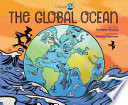
GLOBAL OCEAN
By: rochelle strauss | Published: May 2022
The global ocean is in trouble — and kids can help! Though we think of Earth’s five oceans as separate and distinct, they are actually a... [Read More]
The global ocean is in trouble — and kids can help! Though we think of Earth’s five oceans as separate and distinct, they are actually a linked system of circulating water that is one single ocean — the global ocean. This comprehensive overview explores the global ocean’s enormous influence on the planet, as well as humans’ often-detrimental influence on the ocean. But it also highlights many inspiring initiatives underway to restore and heal Earth’s most important feature, making its message of urgency as hopeful as it is accurate. Kids will happily dive into these beautiful pages to learn about our magnificent global ocean — and what they can do to help save it!
Theme: Environmental Issues, Activism, Citizen Kid Series
- ISBN
9781525304910 - Binding
Hardcover Canadian - Category
Science - Earth, Ecology & Ecosystems
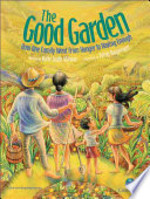
GOOD GARDEN
By: katie milway | Published: September 2010
After Maria Duartes' father leaves the farm to find work and she must plant next year's crop, her teacher instructs her on how to terrace the land... [Read More]
After Maria Duartes' father leaves the farm to find work and she must plant next year's crop, her teacher instructs her on how to terrace the land and use compose to improve her garden so that her family can have enough food for the coming year.
Theme: Activism, Diversity, Advanced Picture Book, Citizen Kid Series
- ISBN
9781554534883 - Binding
Hardcover Canadian - Category
Social Studies - Issues (economic, Political And Social)
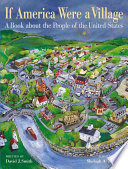
IF AMER WERE A VILLAGE
By: david smith | Published: August 2009
By narrowing down the United States' population to a village of one hundred people, the author offers up statistics about nationalities, familes,... [Read More]
By narrowing down the United States' population to a village of one hundred people, the author offers up statistics about nationalities, familes, religion, occupations, wealth, health, age, and energy use.
Theme: Citizen Kid Series
- ISBN
9781554533442 - Binding
Hardcover Canadian - Category
Social Studies - Countries (including Life In)
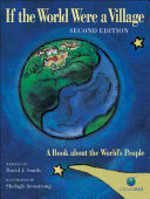
IF THE WORLD WERE A VILLAGE
By: david smith | Published: February 2011
By narrowing down the world's population to a village of one hundred people, the author offers up some surprising statistics about religion, food,... [Read More]
By narrowing down the world's population to a village of one hundred people, the author offers up some surprising statistics about religion, food, water, nationalities, language, age, and education.
Theme: Global Issues, Big Ideas, Citizen Kid Series
- ISBN
9781554535958 - Binding
Hardcover Canadian - Category
Social Studies - Issues (economic, Political And Social)
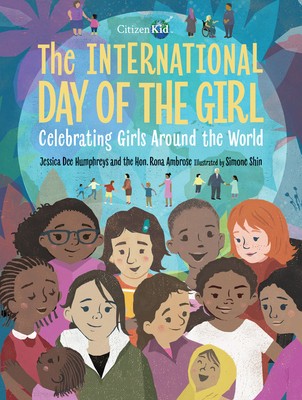
INTERNATIONAL DAY OF THE GIRL
By: jessica humphreys & rona ambrose | Published: September 2020
The UN designated October the 11th as the International Day of the Girl, a day to increase awareness of problems that affect girls around the world... [Read More]
The UN designated October the 11th as the International Day of the Girl, a day to increase awareness of problems that affect girls around the world and to encourage progress toward gender equality. 9 stories inspired by the real-life experiences of girls from all over the globe bring to light the importance of this day. Each story is set in a different country and sensitively describes an inequity faced by a character and how she addressed it. Their powerful, and empowering, experiences will stir the activist in every child.
Theme: Girl Power, Diversity, Global Issues, Citizen Kid Series
- ISBN
9781525300585 - Binding
Hardcover Canadian - Category
Social Studies - Issues (economic, Political And Social)
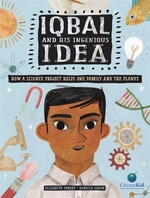
IQBAL & HIS INGENIOUS IDEA
By: elizabeth suneby | Published: May 2018
It's monsoon season in Bangladesh, which means Iqbal's mother must cook the family's meals indoors, over an open fire. The smoke from the fire makes... [Read More]
It's monsoon season in Bangladesh, which means Iqbal's mother must cook the family's meals indoors, over an open fire. The smoke from the fire makes breathing difficult for his mother and baby sister, and it's even making them sick. Hearing them coughing at night worries Iqbal. So when he learns that his school's upcoming science fair has the theme of sustainability, Iqbal comes up with the perfect idea for his entry: he'll design a stove that doesn't produce smoke! With help from his teacher, Iqbal learns all about solar energy cooking, which uses heat from the sun to cook --- ingenious! Has Iqbal found a way to win first prize in the science fair while providing cleaner air and better health for his family at the same time? Award-winning author Elizabeth Suneby's thoroughly researched and inspiring story introduces young children to the problems associated with open-flame cooking in the developing world, as well as background information on sustainable technology. Part of the CitizenKid collection, this book uses the common experience of a science fair project to help children recognize that they, too, can help make the world a better place through innovative thinking and creative problem solving. The artwork by Rebecca Green, filled with details of everyday life in a Bangladesh village, beautifully evokes a sense of place and culture. Iqbal offers a perfect example for the character education subject of initiative. End matter includes information about clean cookstoves, a DIY solar cooker activity and a glossary.
Theme: Citizen Kid Series, Inventions, Social Justice , Activism
- ISBN
9781771387200 - Binding
Hardcover - Category
Picture Book - Advanced
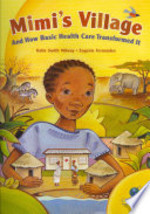
MIMI'S VILLAGE
By: katie milway | Published: August 2012
After Mimi's sister almost dies from drinking dirty water, Mimi and her family begin a series of measures to make their village a healthier place,... [Read More]
After Mimi's sister almost dies from drinking dirty water, Mimi and her family begin a series of measures to make their village a healthier place, including such things as boiling water, using bed nets, getting vaccinations, and eating better food.
Theme: Social Justice , Big Ideas, Citizen Kid Series
- ISBN
9781554537228 - Binding
Hardcover Canadian - Category
Social Studies - Issues (economic, Political And Social)
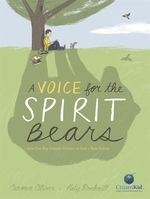
VOICE FOR THE SPIRIT BEARS
By: carmen oliver | Published: May 2019
As a child, Simon Jackson found navigating the world of the school playground difficult. He felt most at home in the woodlands, learning about and... [Read More]
As a child, Simon Jackson found navigating the world of the school playground difficult. He felt most at home in the woodlands, learning about and photographing wildlife. As a teenager, he became fascinated with spirit bears, a rare subspecies of black bear with creamy white fur. These elusive creatures were losing their habitat to deforestation, and Simon knew he had to do something to protect them. He decided he would become the voice for the spirit bears. But first, he would have to find his own. Carmen Oliver's inspiring true story is based on the early life of Simon Jackson, who founded the Spirit Bear Youth Coalition. On his remarkable journey to protect the spirit bears, he met Dr. Jane Goodall and eventually hiked the Great Bear Rainforest --- the home of these elusive animals. Katy Dockrill's captivating art adds depth and beauty to the story. Photos and additional details about Simon Jackson's life and about spirit bears are included in the end matter. Part of the CitizenKid collection, this book demonstrates how one child can be a voice for change. Simon's story is an excellent example of growth mindset at work, highlighting personal growth and overcoming obstacles through activism. This book can also be used to lead discussions about character education as it relates to courage, resilience and perseverance. In addition, it has strong science curriculum links to the environment, animal habitats and the effects of clear-cutting.
Theme: Citizen Kid Series
- ISBN
9781771389792 - Binding
Hardcover Canadian - Category
Social Studies - Issues (economic, Political And Social)
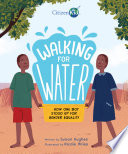
WALKING FOR WATER - HOW ONE BOY STOOD UP FOR GENDER EQUALITY
By: susan hughes | Published: June 2021
A young boy finds a way to help his sister go to school. Victor and his twin sister, Linesi, are close. Only, now that they are eight years old, she... [Read More]
A young boy finds a way to help his sister go to school. Victor and his twin sister, Linesi, are close. Only, now that they are eight years old, she is no longer able to go to school with him. Linesi, like the other older girls in their community, must walk to the river to get water five times a day to help their mother farm. But Victor is learning about equality in school. He’s beginning to realize how boys and girls are not treated equally. And that’s not fair to his sister. So Victor comes up with a plan to help. Can one boy make a difference in an unequal world? It turns out, he can!
Theme: Citizen Kid Series, Social Justice , Activism, Gender Equality
- ISBN
9781525302497 - Binding
Hardcover Canadian - Category
Social Studies - General
